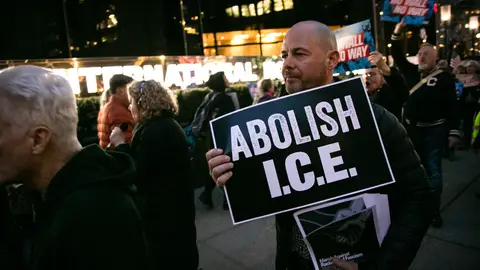ICE Is Detaining Queer and Mentally Ill Immigrants in Solitary Confinement

Thousands of undocumented immigrants in United States Immigration and Customs Enforcement (ICE) custody are being unjustly subjected to solitary confinement, according to a new collaborative report from the International Consortium of Investigative Journalists (ICIJ).
Traditionally, solitary confinement is used as a last resort in jails or detention centers. Whistleblowers and criminal justice professionals like Ellen Gallagher, a policy advisor for the U.S. Department of Homeland Security, have cited its traumatic and psychologically damaging effects for years.
"People [in solitary confinement] were being brutalized," Gallagher told The Intercept, speaking publicly for the first time about the injustices she's witnessed at the hands of federal agencies like ICE.
NBC News, too, found that ICE detainees are being forcibly segregated in solitary for a slew of questionable "offenses," including consensually kissing other detainees, showing signs of mental illness, self-harming, or engaging in minor disciplinary infractions. LGBTQ people, people with mental illness, and disabled people seem to be particularly vulnerable to solitary confinement placements.
Sometimes, it's referred to as "protective custody" and enacted by request of the detainee; in many other instances, solitary confinement is forced upon marginalized people against their will.
One transgender detainee, a 22-year-old trans woman from Central America named Kelly, told NBC News that she spent four months in "protective custody" during 2017, when she was being held at an ICE facility in Louisiana. "The only thing they told me was that it was because of the way I looked. They claimed it was for security reasons."
Kelly was traumatized by the experience, adding that "when I was trying to sleep, I began to have nightmares, horrible memories, things that I didn't want to remember. It's still happening to me."
Joselin Mendez, a trans woman from Nicaragua, said she was sent to solitary confinement twice for minor disciplinary infractions. Mendez doesn't speak English, but the officer handling her refused to speak to her in Spanish. "I felt afraid and anxious," she recalled, "and I would tremble and sweat and I would ask, 'Why is this happening?'"
This isn't the first instance of suspected mistreatment of LGBTQ immigrants at the hands of ICE.
Last May, Roxsana Hernández (pictured above), a 33-year-old trans woman and asylum seeker from Central America, died in ICE custody under suspicious circumstances. An independent autopsy of her body revealed signs of abuse leading up to her death, and other detainees claimed Hernández, who was HIV-positive, was repeatedly denied medical attention.
In March, lawyers for the ACLU, Las Americas Immigrant Advocacy Center, and the Santa Fe Dreamers Project sent a complaint to ICE on behalf of a dozen LGBTQ detainees in New Mexico alleging they suffered from sexual harassment and abuse at the hands of other detainees, verbal harassment from guards, and that ICE officials violated their own regulations by denying hormones to trans detainees. The LGBTQ detainees also allege they were placed in solitary confinement when they raised issues with their treatment.
Meanwhile, a spokesperson for ICE has defended the agency's use of solitary confinement, telling NBC News that ICE "is firmly committed to the safety and welfare of all those in its custody":
The use of restrictive housing in ICE detention facilities is exceedingly rare, but at times necessary, to ensure the safety of staff and individuals in a facility. ICE's policy governing the use of special management units protects detainees, staff, contractors and volunteers from harm by segregating certain detainees from the general population for both administrative and disciplinary reasons.





